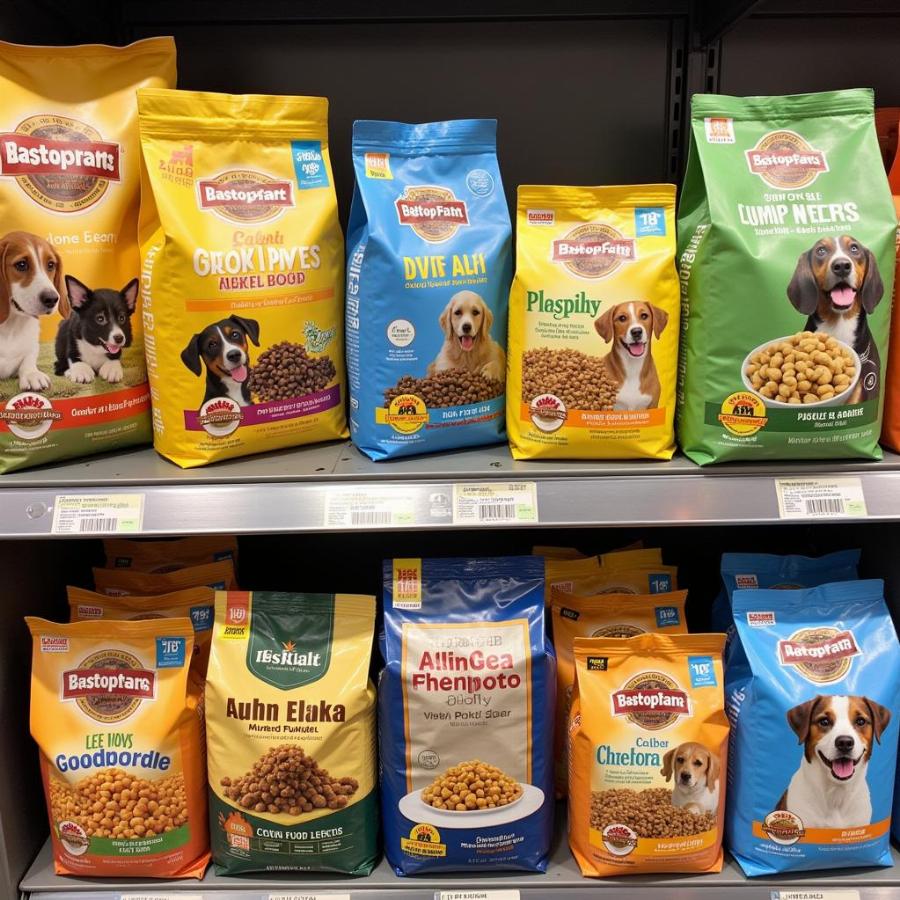Choosing the right food for your furry friend can be a daunting task, especially with so many options available. If you’re looking for dog food that does not contain corn, you’ve come to the right place. This article will delve into why corn is often avoided in dog food, explore the benefits of corn-free diets, and provide a comprehensive guide to help you make the best choice for your canine companion.
Why Choose Corn-Free Dog Food?
Many pet owners are increasingly opting for corn-free dog food due to concerns about allergies, digestive issues, and the overall nutritional value. While corn itself isn’t inherently toxic to dogs, it can be a source of problems for some. It’s often used as a filler in cheaper dog foods, providing calories but lacking essential nutrients. For some dogs, corn can trigger allergic reactions, leading to skin irritations, itching, and digestive upset. Additionally, corn is a complex carbohydrate that can be difficult for some dogs to digest, potentially causing bloating, gas, and loose stools. Opting for a corn-free diet can alleviate these issues and contribute to a healthier, happier pup.
Benefits of a Corn-Free Diet for Dogs
Switching to a corn-free dog food can offer a range of benefits, especially for dogs with sensitivities. Improved digestion is a key advantage, as corn-free formulas often utilize more digestible carbohydrate sources like sweet potatoes or brown rice. This can lead to less bloating, gas, and firmer stools. Corn-free diets can also contribute to healthier skin and a shinier coat, particularly in dogs with corn allergies. By eliminating a potential allergen, you can reduce itching, inflammation, and other skin problems. Furthermore, corn-free foods often prioritize higher quality protein sources, providing essential amino acids for muscle development and overall health.
How to Choose the Right Corn-Free Dog Food
Selecting the appropriate corn-free dog food involves considering your dog’s individual needs, including age, breed, activity level, and any existing health conditions. can dogs eat grits Look for foods with high-quality protein sources as the primary ingredients, such as meat or fish. Check the ingredient list carefully to ensure it’s free from corn and other potential allergens. Avoid foods with artificial colors, flavors, and preservatives. Consult your veterinarian for personalized recommendations based on your dog’s specific requirements.
Understanding Dog Food Labels
Reading and understanding dog food labels is crucial for making informed choices. Pay close attention to the guaranteed analysis, which provides the minimum percentages of crude protein, fat, fiber, and moisture. The ingredient list is also essential, as it lists all ingredients in descending order by weight. my dog smells like corn chips Look for the AAFCO (Association of American Feed Control Officials) statement to ensure the food meets minimum nutritional standards.
What are some good corn-free dog food brands?
Several reputable brands offer a variety of corn-free dog food options. Researching different brands and comparing their ingredients and nutritional profiles can help you find the best fit for your dog. cheap dog food in bulk Always consider your dog’s individual needs and consult with your veterinarian for personalized recommendations.
Is Corn-Free Dog Food More Expensive?
Corn-free dog foods tend to be slightly more expensive than those containing corn, primarily due to the higher quality ingredients used. However, the potential health benefits and improved digestion can be worth the extra cost, especially for dogs with sensitivities. is whole hearted dog food good Consider it an investment in your dog’s long-term health and well-being.
 Popular Corn-Free Dog Food Brands
Popular Corn-Free Dog Food Brands
Transitioning to a Corn-Free Diet
When switching your dog to a corn-free diet, it’s important to do so gradually to avoid digestive upset. Start by mixing a small amount of the new food with the old food, gradually increasing the proportion of the new food over several days. sensitive food for dogs Monitor your dog for any signs of digestive issues or allergies and consult your veterinarian if necessary.
Conclusion
Choosing dog food that does not contain corn can significantly benefit your dog’s overall health, especially if they have sensitivities. By understanding the reasons for avoiding corn, recognizing the advantages of a corn-free diet, and learning how to choose the right formula, you can provide your furry companion with the optimal nutrition they deserve.
FAQ
- Is corn toxic to dogs? Corn isn’t toxic, but it can be an allergen or difficult to digest for some dogs.
- What are the signs of a corn allergy in dogs? Itching, skin irritation, digestive upset, and ear infections can be signs of a corn allergy.
- What are some alternatives to corn in dog food? Sweet potatoes, brown rice, and quinoa are common alternatives to corn.
- How do I transition my dog to a corn-free diet? Gradually mix the new food with the old food over several days.
- Are all corn-free dog foods the same? No, quality and ingredients vary. Always check the label carefully.
- Is a corn-free diet suitable for all dogs? Consult your vet for personalized advice based on your dog’s needs.
- Where can I buy corn-free dog food? Pet stores, online retailers, and some veterinary clinics sell corn-free dog food.
Beaut Dogs is your trusted source for all things dog-related. We provide comprehensive information and expert advice to help you care for your canine companion. For personalized support and detailed answers to your questions, contact us via Email at [email protected]. Beaut Dogs is committed to providing you with the knowledge and resources you need to ensure your dog’s health and happiness.